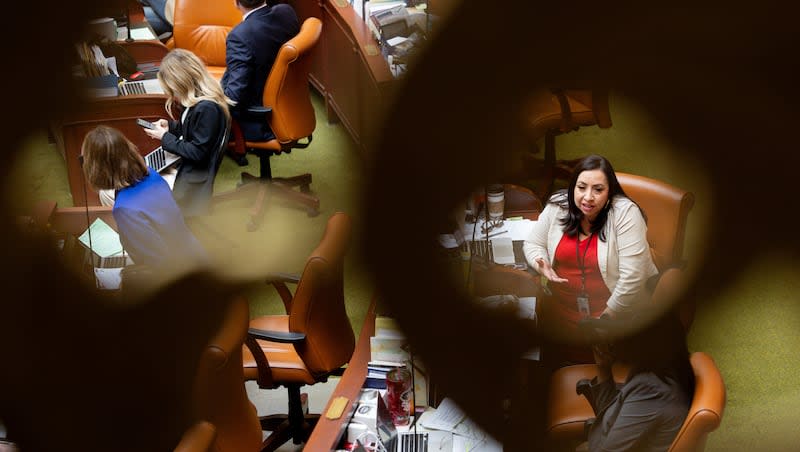‘The toughest session I’ve had,’ Utah House Democrats say

Utah’s House Democratic leadership said the legislative session ending Friday was the most politically polarized they’ve experienced. They cited a new change moving the candidate filing period to before the session as one reason why.
“One thing is very clear,” Minority Caucus Manager Rosemary Lesser, D-Ogden, told reporters Wednesday. “This experiment of having filing happen before the session is an experiment we need to recognize and change for the future.”
Lawmakers passed SB170 in 2022 with bipartisan support. The bill shifted the window for individuals filing a declaration of candidacy with the state from the beginning of March to the first week of January.
Prior to the session, Utah Gov. Spencer Cox said it was hard to tell whether the new law would create “better or worse” incentives for lawmakers, who would now have a clear idea of their primary, or general, election challenges before they cast a single vote, or, in Cox’s case, signed a single bill into law.
“It will change the dynamic, I just can’t say what it’s going to look like,” Cox told the Deseret News in December.
Minority Whip Jennifer Dailey-Provost, D-Salt Lake City, said this simple modification has incentivized legislative behavior geared toward the ballot box instead of solutions.
“We’ve heard comments on the House floor that certain bills weren’t getting support because it’s an election year,” Dailey-Provost said. “There are elected officials who are measuring votes by the delegates watching.”
Minority Leader Angela Romero, D-Salt Lake City, said she felt like “this session has focused on politics more than it has focused on policy.”
She pointed to several pieces of legislation she thought placed too much emphasis on political messaging, including a resolution condemning communism, a bill shoring up the state’s coal production potentially at the expense of ratepayers, a bill outlining ways to reject federal policy deemed unconstitutional, and others requiring the removal of pornographic books in school libraries or allowing chaplains in public schools.
Minority leadership said the passage of two controversial “culture war” bills at the beginning of the session were also evidence of the nation’s polarized political environment creeping into the Utah Capitol.
One bill, HB261, will regulate diversity initiatives at public institutions. The other, HB257, will prohibit some transgender individuals from using public restrooms or changing rooms intended for the opposite sex. The bills were some of the first this session to be signed into law by the governor.
“It’s probably been the toughest session I’ve had and this is going to be my 12th year,” Romero said. “I felt like a lot of policy has been neglected for the politics.”
Even the places where the minority and majority overlap, like funding public education and expanding child tax credits, have been tied to more conservative measures, like private school scholarships and child care deregulation, Romero said.
“We’re put in these compromising positions where they put a bill that has some good value with another bill that we can’t support so then it’s just easier for them to say ‘the Democrats don’t support this’ but we do,” Romero said.
However, despite disagreeing on “probably about 90% of what happened this legislative session,” Romero said her relationship with the new majority leadership team, including House Speaker Mike Schultz, R-Hooper, and Majority Leader Jefferson Moss, R-Saratoga Springs, is strong and is characterized by an open line of communication.
“I appreciate our relationship with the Minority Caucus and celebrate our ability to work across the aisle to find solutions to the pressing challenges facing our communities — including working together to pass policies that protect and enhance the Great Salt Lake, improve public safety, support students and teachers, and pave a way for exciting new opportunities across the state,” Moss told the Deseret News in a written statement on Thursday.
He continued: “We each come to the Capitol for 45 days to serve our communities and better the lives of Utahns and I believe we’re successful in doing so because of our ability to find common ground and prioritize good policy over politics.”
But strong relationships can be undermined, House Democrats said, if political pressures push away opportunities to compromise.
“I believe we all have a job to do here that should be as much as possible independent of the political process,” Lesser said. “We’ve been elected to represent the people and, unfortunately, with filing happening before the session began people were aware of primary opponents.”